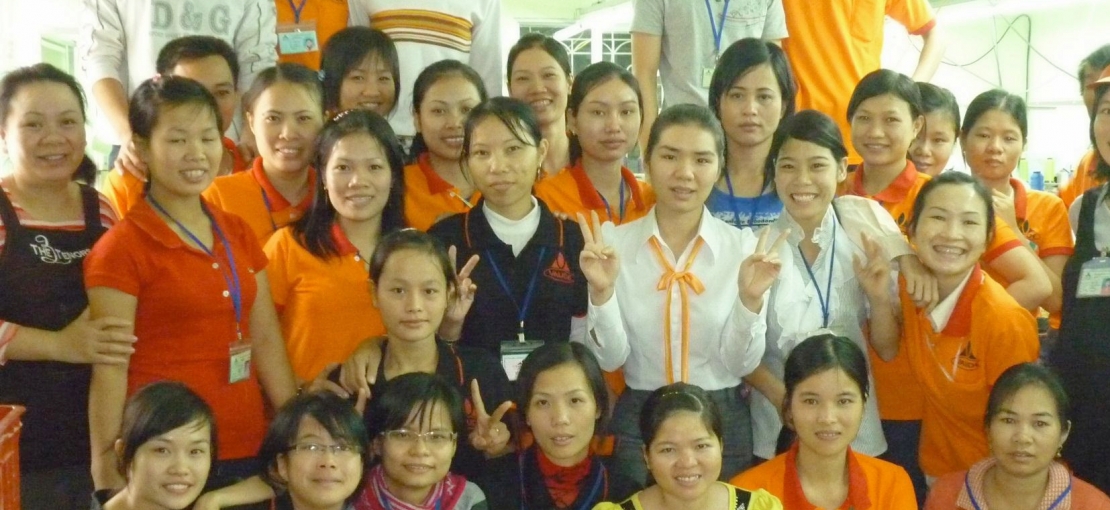
Freedom of association – a learning process for employees and management
What VAUDE requires from its production partners
The right of all workers to form and join trade unions and bargain collectively shall be recognized. The company shall, in those situations in which the right to freedom of association and collective bargaining are restricted under law (such as in China and Vietnam), facilitate parallel means of independent and free association and bargaining for all workers. Workers' representatives shall not be the subject of discrimination and shall have access to all workplaces necessary to carry out their representation functions.
This is regularly reviewed by our employees on-site as well as the Fair Wear Foundation (FWF)
Findings
Nevertheless, there are still serious discrepancies in this area. For us it is a great concern to strengthen workers' rights with our educational work.
Frequent findings in the production facilities:
- Employee representatives are not legitimately elected but are appointed by the executives.
- The workers are not made aware of their rights, in particular about their rights regarding freedom of association.
Together with the relevant producer, VAUDE takes a critical look at all findings and develops specific solutions for each case. Implementation is continuously supported and monitored by VAUDE.
Raising awareness
In all high risk countries, there is a danger that the right to freedom of association and collective bargaining may be violated. Workers are usually not aware of their rights. Often the management violates the right to freedom of association for fear that the workers will become "too powerful" or could strike. For this reason it is important to create the necessary awareness on both sides. This means that workers are educated on their rights, and that the management becomes aware of the benefits of employee representation. Our CSR employees in Asia (employed by VAUDE but working in Asia) play an important role in this. By visiting our production facilities regularly and holding intensive talks with the management, they render permanent educational work. In addition, all producers with whom we work in Vietnam, China and Myanmar participated in the Fair Wear Foundation WEP. Much of this training is concerned with internal communication between management and workers. In addition, workers will be trained regarding their right to freedom of association. More about the WEP training in Social Standards in the Supply Chain.
Alternatives despite legal restrictions
In some production countries, freedom of association is severely restricted by legislation. There are also, of course, production countries where freedom of association is guaranteed by law. However, this is no guarantee that it will be accepted and put into practice.
In China, for example, freedom of association is severely restricted. All workers' organizations must be members of the ACTU (All China Federation of Trade Union), which is largely influenced by government and employers.
It is therefore important that workers and management are shown other methods of functional internal communication, such as by means of independent company employee representatives.
FWF Findings Procedure
The FWF has a complaint hotline in nine production countries, which workers can take advantage of at all times. This is very important because workers’ problems can often not be solved internally. In the production countries themselves, primarily inadequate mechanisms for complaints of human rights violations or poor working conditions exist. The FWF operates here as an impartial complaints office.
Each producer who makes products for VAUDE is required to comply with the Code of Labor Practice (COLP) and this must be posted in the facility or canteen in the local language. The COLP states to whom the worker may lodge a complaint. For this purpose, the FWF has hired a local complaint manager in each country whom the workers can reach via phone or email. In the Fair Wear Foundation WEP training, workers are informed about how the complaints procedure works.
Since the FWF is not yet active in Myanmar, we have established a complaint hotline for Myanmar in collaboration with SMART (www.smartmyanmar.org).
Findings Procedure
The FWF complaint hotline acts as a safety net. This means that when problems cannot be resolved internally or through internal appeal mechanisms, the workers have an external neutral point of contact.
When workers have a complaint, they call the local FWF complaint manager. This person receives the complaint and forwards it to the FWF head office in Amsterdam. The FWF employee responsible for VAUDE forwards the complaint to us and agrees mutually on further procedures. Then VAUDE immediately contacts the affected producer to discuss the complaint and to examine and remedy the situation. When necessary, we arrange for a visit of our Asia-based CSR employee to the production facility.
In 2015 we received two complaints over the FWF complaint hotline. Both complaints were from manufacturing plants in China. They involved the following:
- One worker complained that he and his colleagues were forced to work excessive hours for a short-notice delivery deadline. In addition, the worker reported that overtime had not been paid.
- One worker complained that he had been given a different working position after the holidays. In a following complaint, he stated that he was terminated after making the complaint.
Both complaints were processed immediately in accordance with the FWF complaints procedure. All complaints are publicly available on the FWF website and can be found here.
| GRI: | G4-HR4 |
| GRI: | G4-DMA Complaints Procedure Human Rights Abuses |
| GRI: | G4-DMA Complaints Procedure Labor Practices |






